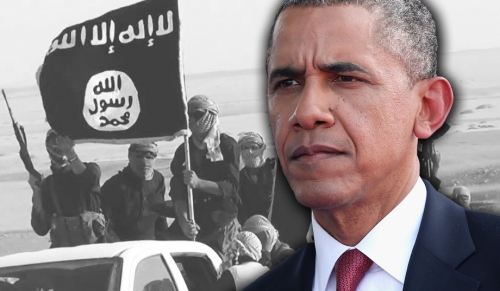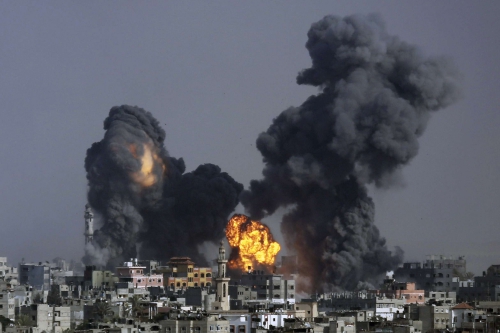
“Guerra perpetua para la paz perpetua”: la dialéctica geopolítica de los EEUU
por Kerry Bolton
Ex: http://paginatransversal.wordpress.com
George Orwell, en su novela distópica 1984 se refiere a una de las consignas del régimen en el poder como “la guerra es la paz” [1]. El erudito revisionista Dr. Charles Beard escribió que “la guerra perpetua para la paz perpetua” es un fundamento de la política exterior estadounidense, y Gore Vidal escribió un libro del mismo nombre [2]. Vidal quería examinar las acciones “terroristas” contra los EEUU de una manera más profunda que las nociones simplistas mecánicamente repetidas por los medios de comunicación, incluso cuando un veterano estadounidense, Timothy McVeigh, fue inducido a actuar contra su propio país. Vidal preguntó: “¿por qué?” [3].
Vidal se refirió a los EEUU como “enemigo del mes” y ya desde 2001, el año del histórico ataque a las torres gemelas, aparecen catalogadas cientos de operaciones militares de los EEUU que se habían producido desde el final de la Segunda Guerra Mundial en todo el mundo. En ese momento, en Kosovo se peleaba por el control de los recursos minerales pero en nombre de la “democracia”. Vidal remarcaba: “Con estos varios cientos de guerras contra el comunismo, el terrorismo, las drogas, o a veces no mucho más, entre Pearl Harbor y el martes 11 de septiembre de 2001 nosotros solíamos dar el primer golpe. Pero, entonces, nosotros somos los buenos, ¿verdad? Verdad“. Además:”Osama, provocado, nos golpeó desde lejos. McVeigh, provocado, nos golpeó desde dentro el 19 de abril de 1995. Cada uno se enfureció por los ataques temerarios de nuestro gobierno en otras sociedades cuando perseguimos lo que un gran historiador estadounidense ha llamado “la guerra perpetua para la paz perpetua” [4].
Guerra perpetua para la Paz Perpetua
Vidal situó el inicio del programa estadounidense de “guerra perpetua para la paz perpetua” con el presidente Harry S. Truman, el 27 de febrero de 1947, cuando hizo de la URSS un hombre del saco para justificar la militarización de los EEUU [5]. Pero ¿por qué los antiguos aliados en la lucha contra el Eje riñieron inmediatamente después de la guerra sobre tan colosales y duraderas bases?
La explicación ortodoxa es que la URSS representaba la nueva amenaza de la conquista del mundo después de la derrota del nazismo. Pero, ¿qué había cambiado de repente para que lo que hizo “Tío Joe” Stalin fuera tan nefasto como lo de Hitler?. La respuesta es que Stalin rechazó la oferta de los EEUU para ser un socio menor en lo que hoy es llamado un “nuevo orden mundial”. Este nuevo orden que los EEUU confiaban establecer – hasta el rechazo de Stalin – descansaba en dos fundamentos: (1) La creación de la Asamblea General de las Naciones Unidas como un parlamento mundial, donde las decisiones serían tomadas por mayoría de votos; (2) La internacionalización de la energía atómica, de nuevo bajo los auspicios de la ONU, conocida como el “Plan Baruch”, llamado así por el “estadista” de los EEUU, banquero y sionista Bernard M. Baruch. La primera opción significaría que el bloque soviético estaría en minoría en la Asamblea General, ya que los EEUU podrían simplemente comprar votos, en el buen estilo liberal-democrático-parlamentario. La reacción soviética fue insistir en que “la autoridad” debía recaer en cambio en el Consejo de Seguridad de la ONU, y que los miembros permanentes podrían vetar cualquier medida, haciendo por lo tanto a la ONU superflua como mecanismo de “gobierno mundial” [6]. Esta inquietud entre los globalistas ha sido recientemente expuesta por el ministro de asuntos exteriores de Nueva Zelanda, Murray McCully, quien ha planteado objeciones al uso del veto por dejar obsoleto el papel de la ONU como policía mundial [7].
El segundo predicado, el “Plan Baruch,” fue considerado por la URSS como un medio por el cual la energía atómica sería puesta bajo el control de facto de los Estados Unidos. Irónicamente, los conservadores estadounidenses se pasaron décadas haciendo campaña en contra de la ONU como herramienta “comunista” hacia un Estado mundial, mientras que fue la URSS la que hundió el proyecto globalista [8].
Tomando la tesis de Charles Beard de “guerra perpetua para la paz perpetua”, un libro con el mismo título compuesto por una serie de artículos de destacados académicos estadounidenses (es decir, no “historiadores de la corte”), fue publicado bajo la dirección del Dr. Harry Elmer Barnes en 1953 [9]. Barnes y otros examinaron la política exterior de los Estados Unidos desde la época de Pearl Harbor. El objetivo era exponer la política intervencionista de Roosevelt que estaba determinada a empujar a los EEUU a la guerra, traicionando su promesa electoral de que nunca enviaría a los estadounidenses a luchar en otra guerra lejos de sus costas. Después de la derrota del Eje, Harry S. Truman inventó otro hombre del saco mundial, la URSS. Barnes cita en su introducción la orwelliana 1984 y el lema dialéctico “la guerra es la paz”, como el medio para establecer un orden mundial.
Barnes y sus colegas publicaron el libro con la esperanza de prevenir a los EEUU respecto a embarcarse en un “rumbo sin retorno”, y mantener en cambio su política tradicional de intereses nacionales y continentales [10]. Desde hace décadas, los Estados Unidos podrían haber llegado a un punto de no retorno. Tal vez la única salida para el resto del mundo a fin de evitar la contaminación, sea mediante la implosión de la Gran Ramera a través de su propio estilo de vida enfermo, tal y como otros lo hicieron a lo largo de la historia en un ciclo cultural de nacimiento, vida y muerte. Algunos teóricos rusos han sugerido que los EEUU se balcanizarán étnicamente, lo que podría dar lugar a la reconquista de partes de los EEUU por parte de los hispanos, y al establecimiento de un Black Belt [Cinturón Negro] separatista.
Sin embargo, la “guerra perpetua”, que en tiempos más recientes ha sido conocida – por sus protagonistas – como el “conflicto constante”, va más allá de la Guerra Fría y del punto de partida de Vidal en 1947. Comenzó incluso antes de la era Roosevelt. Desde su fundación, los EEUU tenían como premisa principal enfrentada al milenarismo masónico y puritano, el principio de ocuparse de sus propios asuntos, y desarrollaron un fuerte movimiento “aislacionista” antes de ambas guerras mundiales. Este principio de “América Primero” fue enunciado, por ejemplo, por John Quincy Adams [11]:
“América no va al extranjero en busca de monstruos que destruir. Ella es la benefactora de la libertad y la independencia de todos. Ella es campeona y reivindicadora sólo de las suyas. Ella recomendará esta causa general mediante la compostura de su voz y la simpatía benigna de su ejemplo. Ella sabe bien que alistándose una única vez bajo otras banderas que no son la suya, aún tratándose de banderas de independencia extranjera, se involucraría a sí misma más allá del poder de estricarse en todas las guerras de intereses e intrigas, de la codicia individual, de la envidia y de la ambición que asumen los colores y usurpan las normas de la libertad. Las máximas fundamentales de su política serían cambiadas insensiblemente de la libertad a la fuerza” [12].
Legado mesiánico
Qué sabio consejo y qué previsión la de Adams. Entonces, ¿cómo y cuándo este cambio de perspectiva, si esto se remonta más allá de la Guerra Fría y de la Primera Guerra Mundial? En realidad, a pesar de las perspectivas de estadistas tempranos como Adams, los EEUU fueron fundados con otra dicotomía trabajando, la del puritanismo y la Francmasonería [13] que convergieron para dar a los EEUU el sentido de tener la misión mesiánica de recrear el mundo a su imagen. A esto se le suma el mesianismo judaico impulsado políticamente por el sionismo. Por lo tanto, hay tres corrientes mesiánicas que convergieron en la psique de las clases dominantes de los EEUU. De forma no sorprendente esta convergencia no es constante, por lo tanto, no hay una conspiración generalizada dominando hasta el último rincón y grieta de la sociedad estadounidense, aunque el presidente Eisenhower en su discurso de despedida aludiese a un “complejo militar-industrial” que no sólo tiene influencia política y económica, sino también cultural. Sin embargo, los generales del Pentágono y los plutócratas de la Comisión Trilateral, por ejemplo, puede que no siempre vean a China de la misma manera, y por lo tanto podría haber una falta de coherencia en la política exterior de los Estados Unidos.
La URSS y los EEUU tenían puntos de vista convergentes sobre algunas cuestiones globales tales como la eliminación de los imperios europeos. Esta convergencia a menudo era considerada por elementos de la derecha, como la John Birch Society, e incluso por comentaristas bien informados como Ivor Benson y A.K. Chesterton, como una evidencia de que ambos estaban controlados por una sola secta. Incluso Juan Perón pensó que ese escenario era probable, porque tanto los comunistas alineados con la URSS, como los USA, querían su desaparición. Ciertamente hubo una convergencia entre la plutocracia y el comunismo en la búsqueda de la eliminación del Eje.
Afortunadamente para el mundo, no existe una unidad sólida entre los aspirantes a conquistadores del mundo, no más que la unidad que había entre las familias de gángsters en la era de la prohibición, a pesar de que al profano le pareciera que todas estaban encaminadas a lograr los mismos objetivos. Sin embargo, esto es la síntesis de lo que podría llamarse la “ideología estadounidense”, que es importante y da una cierta cohesión a la política exterior estadounidense.
El integrante franc-masón del mesianismo de los EEUU, Henry Wallace, quien fue vicepresidente y secretario de agricultura con el presidente Franklin Roosevelt, (ambos franc-masones del grado 32º) alude a esta perspectiva mesiánica cuando escribe:
“Tomará un reconocimiento más definitivo del Gran Arquitecto del Universo antes de que la piedra de ápice sea finalmente puesta en su lugar y esta nación en toda la fuerza de su poder esté en condiciones de asumir el liderazgo entre las naciones, en la inauguración del ‘Nuevo Orden de la Edades” [14].
A lo que se refería era al concepto masónico de la “Gran Obra” en la creación de un “nuevo orden de las edades” (Novus Ordo Seclorum), el lema del Gran Sello de los Estados Unidos, aludiendo a la instalación de la tapa-piedra en la pirámide que se muestra en el sello. Los franc-masones piensan que esto significará la finalización de la “Gran Obra”: Novus Ordo Seclorum. Así es al menos como los franc-masones ven el mundo, y lo dicen abiertamente.
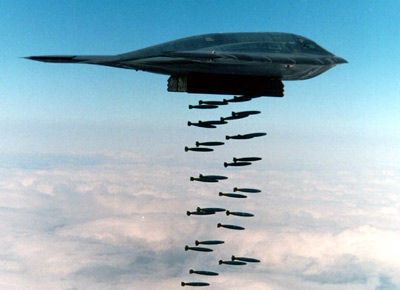 Un factor principal en las guerras y revueltas que han sido promovidas por los EEUU es el deseo de expandir las exportaciones y los mercados financieros. Mientras que se nos dice rutinariamente que “el nacionalismo”, equiparado con “la xenofobia”, es la principal causa de la guerra, del genocidio y de otros males, las guerras y revueltas que han plagado el mundo durante el siglo pasado se han llevado a cabo en nombre de la “democracia” y el “orden mundial”. Estos eran – y son – los objetivos declarados de las dos guerras mundiales, la “Guerra Fría” y la actual “guerra contra el terrorismo”. En todas partes esto ha avanzado y ha continuado mediante la apertura de las naciones a la privatización y a la globalización. Tanto los “Catorce Puntos” de Woodrow Wilson para la reconstrucción internacional después de la Primera Guerra Mundial, como “La Carta del Atlántico” de Roosevelt que establece los objetivos de guerra de los aliados, confirmaron al “libre comercio” como un importante objetivo de guerra. El punto 3 del manifiesto wilsoniano exigía:
Un factor principal en las guerras y revueltas que han sido promovidas por los EEUU es el deseo de expandir las exportaciones y los mercados financieros. Mientras que se nos dice rutinariamente que “el nacionalismo”, equiparado con “la xenofobia”, es la principal causa de la guerra, del genocidio y de otros males, las guerras y revueltas que han plagado el mundo durante el siglo pasado se han llevado a cabo en nombre de la “democracia” y el “orden mundial”. Estos eran – y son – los objetivos declarados de las dos guerras mundiales, la “Guerra Fría” y la actual “guerra contra el terrorismo”. En todas partes esto ha avanzado y ha continuado mediante la apertura de las naciones a la privatización y a la globalización. Tanto los “Catorce Puntos” de Woodrow Wilson para la reconstrucción internacional después de la Primera Guerra Mundial, como “La Carta del Atlántico” de Roosevelt que establece los objetivos de guerra de los aliados, confirmaron al “libre comercio” como un importante objetivo de guerra. El punto 3 del manifiesto wilsoniano exigía:
“La supresión, hasta donde sea posible, de todas las barreras económicas y el establecimiento de una igualdad de condiciones comerciales entre todas las naciones que consienten a la paz y que se asocian ellas mismas para su mantenimiento” [15].
Incluso antes de la Primera Guerra Mundial, Japón había comenzado a usurpar los intereses comerciales estadounidenses en China. Por lo tanto, cuando Roosevelt comenzó a empujar a Japón hacia la guerra fue en interés del libre comercio internacional. Lo que es particularmente interesante es que el ultimátum entregado por el secretario de Estado Cordell Hull al embajador japonés en Washington, al igual que los “Catorce Puntos” y “La Carta del Atlántico” posterior del presidente Roosevelt, estaba basado de nuevo en torno a la demanda de que el libre comercio internacional debe ser la base de una economía mundial, y que las naciones no deben tener el derecho de imponer restricciones al comercio, o perseguir una política económica autárquica. El memorando de Hull exigió en este sentido:
“El principio de la no discriminación en las relaciones comerciales internacionales. El principio de cooperación económica internacional y la abolición del nacionalismo extremo expresado en las restricciones comerciales excesivas. El principio de acceso no discriminatorio de todas las naciones a los suministros de materias primas. El principio de la plena protección de los intereses de los países consumidores y de las poblaciones en lo que se refiere al funcionamiento de los acuerdos internacionales de productos básicos. El principio de la creación de tales instituciones y acuerdos de financiación internacional que puedan prestar ayuda a las empresas esenciales y al desarrollo continuo de todos los países y puedan permitir los pagos a través de procesos de comercio en consonancia con el bienestar de todos los países” [16].
“La Carta del Atlántico”, impuesta a Winston Churchill por Franklin Roosevelt, reiteró estos objetivos, a saber, que los EEUU y Gran Bretaña “se esforzarán, con el debido respeto a sus obligaciones existentes, por promover el disfrute de todos los Estados, grandes o pequeños, vencedores o vencidos, de acceso, en condiciones de igualdad, al comercio y a las materias primas del mundo que son necesarias para su prosperidad económica“.
El hijo del presidente Roosevelt, Elliott, consignó que su padre dijo a Churchill:
“Por supuesto, después de la guerra, una de las condiciones previas de cualquier paz duradera tendrá que ser la mayor libertad posible del comercio. Ninguna barrera artificial…” [17].
“Roosevelt declaró que los acuerdos comerciales imperiales tendrían que irse, y remarcó que la incursión del Tercer Reich en el comercio de Europa había sido una de las principales causas de la guerra. Churchill habló con desesperación, ‘Sr. Presidente, creo que usted está tratando de acabar con el Imperio Británico. Cada idea que usted contempla acerca de la estructura del mundo de la posguerra lo demuestra‘” [18].
Como Harry Elmer Barnes y un grupo de estudiosos bien calificados señalaron, Pearl Harbor fue un artificio para llevar a los EEUU a la guerra, cuando la tentativa de Roosevelt de provocar a los alemanes para que dispararan los primeros tiros en el Atlántico no funcionó. El ultimátum de Estados Unidos a Japón fue diseñado para imponer condiciones imposibles que obligaran a los japoneses a actuar. Un testimonio adicional proviene del yerno de Roosevelt, el coronel Curtis Dall, quien destacó el belicismo de los miembros de la administración Roosevelt, y más tarde averiguó que en Pearl Harbor se había negado la advertencia del ataque japonés [19]. Es una de las mayores “falsas banderas” que continúan siendo utilizadas por los EEUU para crear histeria de guerra.
El factor sionista
Ambas guerras mundiales fueron importantes en el establecimiento de Israel como una fuente permanente de conflictos en el centro del mundo musulmán. Los sionistas persuadieron a los aliados anglo-franceses durante la Primera Guerra Mundial de que tenían intereses comunes al apoyar la creación de un estado judío, después de haber fracasado en persuadir al Kaiser y los otomanos. Con las promesas anglo-francesas a los árabes acerca de la independencia de la dominación otomana, a cambio de su ayuda fundamental contra los turcos y los alemanes, el escenario estaba listo para lo que podría haber sido una perdurable amistad entre Occidente y Arabia, y el mundo sería hoy un lugar muy diferente.
La correspondencia entre Sharif Hussein de La Meca y Sir Henry McMahon, Comisionado británico en El Cairo durante 1915 y principios de 1916, culminó con la garantía de McMahon del apoyo británico a la independencia dentro de las fronteras solicitadas, siempre y cuando los intereses franceses no fueron socavados [20]. En octubre de 1916 se estableció un acuerdo entre T.E. Lawrence y el diplomático Sir Ronald Storrs con Husayn ibn ‘Ali, emir de La Meca, y sus hijos, que luchaban contra el dominio turco.
Con ambas partes satisfechas en cuanto a las garantías, que incluyeron una Palestina soberana, la revuelta árabe estalló en el Hiyaz el 5 de junio de 1916. Con la ayuda árabe, los británicos fueron capaces de repeler la tentativa alemana de tomar Adén y bloquear el Mar Rojo y el Océano Índico. Esto fue decisivo [21]. Los árabes también desviaron significativas fuerzas turcas que habían sido destinadas para un ataque contra el general Murray en su avance sobre Palestina. El general Allenby se refirió a la ayuda árabe como de “un valor incalculable“. Los árabes sufrieron mucho con la venganza turca. Decenas de miles de árabes murieron de hambre en Palestina y el Líbano porque los turcos retuvieron los alimentos. Jamal Pasha, jefe de las fuerzas turcas, manifestó que tenía que usar las fuerzas turcas contra Ibn Saud en la Península Arábiga, cuando esas tropas deberían haber estado “derrotando a los británicos en el Canal [de Suez] y capturando El Cairo” [22].
El Acuerdo Sykes-Picot de 1916 entre Gran Bretaña y Francia puso “partes” de Palestina bajo administración internacional previo acuerdo entre los aliados y con los árabes representados por el Sharif de La Meca [23]. Esto ya contenía las semillas de la duplicidad, ya que dio el control a dos potencias sobre Irak, Siria, Líbano y Transjordania, incumpliendo el compromiso que ya había sido dado por los británicos a Sharif Hussein, y sin su conocimiento.
Cuando la Rusia bolchevique expuso el acuerdo Sykes-Picot a los árabes en 1918, Hussein pidió aclaraciones a Gran Bretaña, y Lord Balfour respondió que: “El Gobierno de Su Majestad confirma las promesas anteriores respetando el reconocimiento de la independencia de los países árabes” [24]. Esto fue confirmado por la británica “Declaración de los Siete” en El Cairo [25].
Sin embargo, Sir Mark Sykes, responsable del Acuerdo Sykes-Picot, sugirió al Gabinete de Guerra británico que si Palestina era ofrecida como una patria judía, la simpatía judía podía ser movilizada para la causa aliada, y los EEUU podrían ser inducidos a unirse al conflicto. El juez de la Corte Suprema de Estados Unidos Louis Brandeis utilizó su influencia para inducir al Presidente Woodrow Wilson a adoptar una política intervencionista [26]. A cambio del apoyo sionista los británicos renegaron de sus promesas a los árabes, y en secreto se comprometieron a apoyar una patria judía en Palestina; una garantía que se conoció como la Declaración Balfour. Este esquema prolongó la guerra, que podría haber sido resuelta de una manera más equitativa y, por tanto, seguramente habría cambiado el curso de la historia.
El comandante británico en Palestina, D.G. Hogarth, fue instruido para asegurar a Hussein que cualquier asentamiento de judíos en Palestina no se permitiría en detrimento de los palestinos. Hussein por su parte estaba dispuesto a permitir a judíos establecerse en Palestina y un fácil acceso a los lugares santos, pero no aceptaría un estado judío. Hogarth debía relacionar que las promesas hechas al mismo tiempo tanto a los árabes como a los judíos no eran conciliables [27].
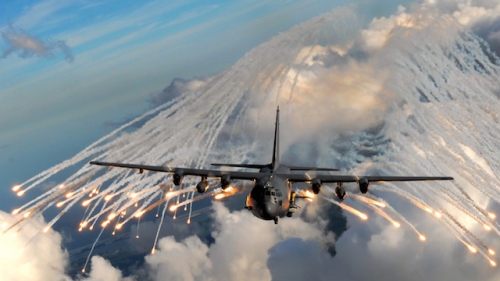
Los propagandistas sionistas comenzaron desde entonces la mitología sobre los árabes que ha continuado hasta la actualidad, uno de los primeros mitos fue obra de James A. Malcolm, asesor del Gobierno británico para Asuntos Orientales. Malcolm fue criado por la familia Sassoon, la riqueza y el poder de la dinastía Sassoon se basaba en el tráfico de opio. Malcolm fue instrumental en llevar las negociaciones para la Declaración Balfour. Posteriormente afirmó que la revuelta árabe no fue importante en el esfuerzo de guerra, [28] un insulto muy diferente de las memorias de T.E. Lawrence, que terminó amargamente desilusionado con la forma en que los árabes habían sido traicionados [29].
El Conflicto constante
Rusia e Israel no tardaron en entrar en disputa, en la antigua animosidad entre dos legados mesiánicos reanudada después de un breve interludio de apoyo soviético a Israel. En 1952 el “Juicio de la traición de Praga” equiparó el sionismo con la traición y ahorcó a un grupo de dirigentes del Partido Comunista, en su mayoría judíos. El bloque soviético se convirtió en un centro de antisionismo [30]. Rusia reanudó su misión mesiánica (que ni siquiera el bolchevismo ateo pudo reprimir por mucho tiempo, por no hablar de las lisonjas del consumismo occidental), de naturaleza mística, y con la perspectiva mundial de “Rusia, la Tercera Roma” descrita por Dostoievski y otros, un mesianismo que rivaliza con el del judaísmo y el del dispensacionalismo norteamericano.
Rusia, el eterno problema, rechazó de nuevo la oferta de asociación con un “nuevo orden mundial” cuando Putin asumió el poder. La situación era análoga a la negativa de Stalin ante la misma oferta directamente después de la Segunda Guerra Mundial. El resultado ha sido el de sumir al mundo en un estado permanente de caos, en el que la fatiga y la corrupción hasta el momento empujan al mundo hacia el abrazo pestilente de los EEUU.
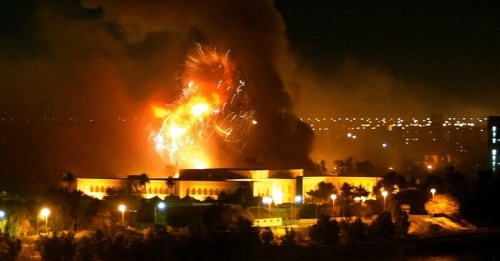
El caos de décadas en gran parte puede atribuirse a la expulsión de lo que Stalin llamó “cosmopolitas desarraigados” [31], incluyendo, en particular, a Trotsky y sus seguidores. Tal era el odio trotskista hacia la URSS a partir de entonces, que los trotskistas engrosaron las filas de la Guerra Fría, y se convirtieron en los líderes de las ideologías y de los estrategas estadounidenses, hasta el punto de que Sedova Trotsky se convirtió en protagonista para los EEUU durante la Guerra de Corea, con el argumento de que la URSS era un mayor enemigo para el socialismo que los EEUU. Los trotskistas se convirtieron en fundadores del llamado “movimiento neo-conservador”, que en consecuencia es cualquier cosa menos “conservador”. Se unieron con los liberal-demócratas y fundaron la National Endowment for Democracy para promover la “revolución mundial”. Ellos han fomentado las “revoluciones de colores” en todo el mundo. Propagan la podredumbre moral y cultural para destruir las sociedades tradicionales, en nombre del “progreso”, los “derechos humanos” y la “democracia” [32] y, como la falsa revuelta de la Nueva Izquierda en los años 1960 y 1970, manipulan a la juventud con su opiáceos de decadencia moral y cultural, y se jactan de ello [33].
El teniente coronel Ralph Peters [34] parece haber acuñado el término “conflicto constante“, título de un artículo que escribió en un importante diario de estrategia militar, en el que dijo acerca de esta subversión política y cultural:
“Hemos entrado en una era de conflicto constante.
“Estamos entrando en un nuevo siglo norteamericano, en el que nos haremos aún más ricos, culturalmente más letales, y cada vez más poderosos. Vamos a despertar odios sin precedentes.
“La información destruye trabajos tradicionales y culturas tradicionales; seduce, traiciona, permanece aún invulnerable. ¿Cómo puedes contraatacar la información que otros han vuelto contra ti? No hay ninguna opción efectiva que no sea el rendimiento competitivo. Para aquellos individuos y culturas que no pueden unirse o competir con nuestro imperio de la información, sólo hay un fracaso inevitable… La información, de Internet a los vídeos de rock, no se podrá contener, y el fundamentalismo no puede controlar a sus hijos. Nuestras víctimas voluntarias.
“Está de moda entre las élites intelectuales del mundo censurar la “cultura americana”, con nuestros críticos domésticos entre los más ruidosos en la protesta. Pero las elites intelectuales tradicionales tienen una relevancia cada vez menor, sustituidas por las élites cognitivo-prácticas – figuras tales como Bill Gates, Steven Spielberg, Madonna, o nuestros políticos más exitosos -, seres humanos que pueden reconocer o crear apetitos populares, recreándolos como sea necesario. La cultura americana contemporánea es la más poderosa de la historia, y la más destructiva de las culturas en competición. Mientras que algunas otras culturas, como las de Asia oriental, parecen lo suficientemente fuertes como para sobrevivir al ataque a través de comportamientos adaptativos, la mayoría no lo son. El genio, el arma secreta de la cultura americana es la esencia que las élites desprecian: la nuestra es la primera cultura popular genuina. Esto acentúa la comodidad y la conveniencia – la facilidad – y eso genera placer para las masas. Somos el sueño de Karl Marx, y su pesadilla.
“Los revolucionarios seculares y religiosos de nuestro siglo han cometido idéntico error, imaginando que los trabajadores del mundo o los fieles no pueden esperar a volver a casa por la noche para estudiar a Marx o el Corán. Bien, Joe Sixpack, Ivan Tipichni, y Ali Quat prefieren “Baywatch”. Los Estados Unidos lo han entendido y somos brillantes en poner en práctica nuestro conocimiento, y nuestro poder cultural obstaculizará incluso a aquellas culturas que no socavamos. No hay un “par competidor” en el campo cultural (o militar). Nuestro imperio cultural tiene adictos – hombres y mujeres en todas partes – pidiendo más a gritos. Y pagan por el privilegio de su desilusión.
“No habrá paz. En todo momento durante el resto de nuestras vidas, habrá en todo el mundo múltiples conflictos mutando en las formas. Los conflictos violentos dominarán los titulares, pero las luchas culturales y económicas serán más firmes y en definitiva más decisivas. El papel de facto de las fuerzas armadas de los Estados Unidos será el de mantener la caja fuerte mundial para nuestra economía, y abierta a nuestro asalto cultural. Para esos fines, vamos a hacer una buena cantidad de matanzas” [35].
Peters, sin hablar específicamente con los términos de Spengler, por ejemplo, escribe en términos de sociedades orgánicas e identifica además a los EEUU con un contagio. Peters alaba la “fuerza” de los EEUU en su capacidad de infectar a otros, siendo el resultado la etiolación. Es la pseudo-fuerza de un hombre enfermo capaz de matar a otros a través de la difusión de su virus. Peters es inequívoco al respecto. Se podría señalar que tal parasitismo, como un cáncer, destruye el anfitrión, y por lo tanto a sí mismo. En última instancia, hay algo sociópata en este imperativo de poder auto destructivo; no una voluntad de poder, y de ahí una voluntad de vida, sino una voluntad de muerte; thánatos racionalizado como la libertad; la libertad de morir. Como alguien infectado con el virus del SIDA que se embarca en una misión para infectar a muchos otros antes de su propia muerte.
La Destrucción creativa
Esta es la podredumbre moral y cultural que Stalin llamó “cosmopolitismo desarraigado”, y que ha sido utilizado como un proceso de ablandamiento por parte de los EEUU desde la Guerra Fría, en lo que se ha llamado la “guerra fría cultural” [36]. De la podredumbre moral y cultural surgieron las “revoluciones de colores” en nombre del tipo de libertad libertina que sirve de señuelo a los EEUU. Incluso la Unión Soviética sucumbió y, como fichas de dominó, los estados del bloque soviético; así, la “Primavera Árabe”. Aquellos estados que no sucumbieron a la revuelta interna fueron bombardeados hasta la sumisión; a saber: Serbia, Irak, Libia y Siria en la actualidad.
Michael Ledeen [37], como uno de los principales defensores de la misión mesiánica de los Estados Unidos, en términos similares a los de Peters, insta a los EEUU a cumplir con su “misión histórica” de “exportar la revolución democrática” a todo el mundo. Como Peters, Ledeen predica esta revolución mundial como una parte necesaria de la “guerra contra el terrorismo“, pero hace hincapié en que la “revolución mundial” ha sido siempre la “misión histórica” de los EEUU:
“Somos el único país verdaderamente revolucionario en el mundo, como lo hemos sido durante más de 200 años. La destrucción creativa es nuestro segundo nombre. Lo hacemos de forma automática, y eso es precisamente por lo que los tiranos nos odian y se ven obligados a atacarnos. La libertad es nuestra arma más letal, y los pueblos oprimidos de los regímenes fanáticos son nuestro mayor activo. Tienen que escuchar y ver que estamos con ellos, y que la misión occidental es ponerlos en libertad, bajo líderes que los respetarán y conservarán su libertad.
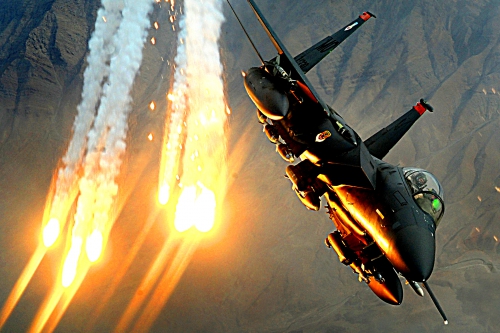
“Es hora de nuevo de exportar la revolución democrática. A los que dicen que no se puede hacer, sólo tenemos que apuntar a la década de 1980, cuando condujimos una revolución democrática global que derribó tiranos de Moscú a Johannesburgo. Entonces, también, personas inteligentes dijeron que no se podía hacer, y se rieron del descaro de Ronald Reagan cuando dijo que los tiranos soviéticos estaban acabados, y pidió a Occidente pensar seriamente en la era pos-comunista. Destruimos el imperio soviético, y después nos alejamos de nuestro gran triunfo en la tercera guerra mundial del siglo XX. Como tristemente escribí en ese momento, cuando los Estados Unidos abandonan su misión histórica, nuestros enemigos cobran ánimo, se hacen más fuertes y, finalmente, comienzan a matarnos de nuevo. Y así lo han hecho, forzándonos a asumir nuestra responsabilidad revolucionaria, y derribar los regímenes despóticos que han hecho posible los actos de odio del 11 de septiembre” [38].
Aquí vemos la fórmula dialéctica orwelliana de la “destrucción creativa“, como la base de una mesiánica “misión revolucionaria mundial” que Ledeen afirma es innata a los EEUU. El enemigo es la tradición, que es derribada en nombre de la “libertad”. La “libertad” para comerciar y consumir; principalmente comerciar y consumir la basura tóxica de la cultura-degeneración que es activamente fomentada por los EEUU.
Notas
[1] George Orwell, Nineteen-Eighty-Four (1948), 1: 1.
[2] Gore Vidal, Perpetual War for Perpetual Peace: How We Got To Be So Hated (2002).
[3] Ibid.
[4] Ibid.
[5] Ibid., “A Letter to be Delivered.”
[6] K. R. Bolton, Stalin: The Enduring Legacy (London: Black House Publishing, 2012), pp. 125-136.
[7] K.R. Bolton, “New Zealand’s naivety at United Nations has sinister implications,” Foreign Policy journal, http://www.foreignpolicyjournal.com/2015/06/29/new-zealands-naivety-at-un-security-council-has-sinister-implications/
[8] K. R. Bolton, Stalin op. cit., pp. 125-134.
[9] Harry Elmer Barnes (ed.), Perpetual War for Perpetual Peace (Caldwell, Idaho: The Caxton Printers, 1953).
[10] Ibid., viii.
[11] John Quincy Adams fue el sexto Presidente de los EEUU, ejerció como embajador estadounidense en Rusia y fue un oponente de la Franc-Masonería.
[12] Cited by Barnes, et al, op. cit.
[13] Nicholas Hagger, The Secret Founding of America: The Real Story of Freemasons, Puritans & the Battle for the New World (London: Watkins Publishing, 2007).
[14] Henry A. Wallace, Statesmanship and Religion (New York: Round Table Press, 1934), pp. 78-79.
[15] Woodrow Wilson, “Fourteen Points,” 1918, II, http://www.fordham.edu/halsall/mod/1918wilson.html
[16] “Outline of Proposed Basis for Agreement Between the United States and Japan,” Section I, November 26, 1941.
[17] Elliott Roosevelt, As He Saw It (New York: Duell, Sloan and Pearce, 1946), p. 35.
[18] Ibid., p. 31.
[19] Curtis D. Dall, FDR: My Exploited Father-in-Law (Tulsa: Christian Crusade Publications, 1968), pp. 133, 162, 164.
[20] Sami Hadawi, Bitter Harvest: Palestine 1914-79 (New York: Caravan Books, 1979), p. 11.
[21] Alfred M. Lilienthal, The Zionist Connection What Price Peace? (New York: Dodd, Mead & Co., 1978), p. 17.
[22] Quoted by Lilienthal, ibid.
[23] Hadawi, op. cit., p. 12.
[24] Lilienthal, op. cit., 18.
[25] Ibid.
[26] Hadawi, op. cit., 13.
[27] Lilienthal, op. cit., 18-19.
[28] James A. Malcolm, “Origins of the Balfour Declaration: Dr. Weizmann’s Contribution” (London, 1944). http://www.mailstar.net/malcolm.html
[29] T. E. Lawrence, Seven Pillars of Wisdom (London: Black House Publishing, 2013), “Introduction” by Bolton.
[30] Bolton, Stalin…, op. cit., pp. 149-155.
[31] Ibid., pp. 28-54.
[32] Bolton, Revolution from Above (London: Arktos Media Ltd., 2011), pp. 213-244.
[33] Ibid., pp. 184-200.
[34] Peters, en ese momento Mayor [Comandante], destinado en la la Oficina del Jefe Adjunto del Estado Mayor de Inteligencia. Su área de especialización es el antiguo bloque soviético y Eurasia.
[35] Ralph Peters, “Constant Conflict”, Parameters, U.S. Army War College, Summer 1997, pp. 4-14.
[36] Frances Stonor Saunders, The Cultural Cold War: The CIA and the World of Arts and Letters (New York: The New Press, 1999).
[37] Ledeen ha sido consultor del Consejo de Seguridad Nacional de Estados Unidos, el Departamento de Estado y el Departamento de Defensa, y actualmente está trabajando con la Foundation for Defense of Democracies, que tiene como objetivo el “cambio de régimen” en todo el mundo.
[38] Michael Ledeen, “Creative Destruction: How to Wage a Revolutionary War”, National Review online, 20 September 2001.
(Traducción Página Transversal).
Fuente: Katehon.
Acerca de estos anuncios




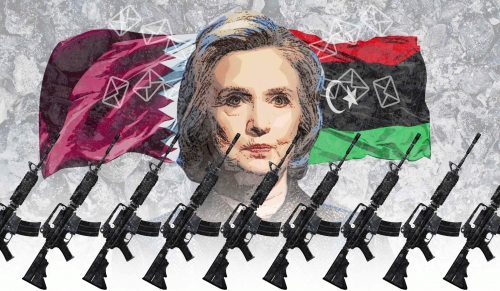


 del.icio.us
del.icio.us
 Digg
Digg

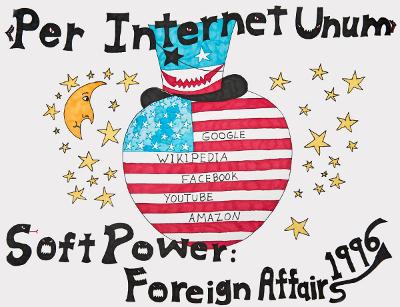
 La vision du soft power se heurte ou se mélange souvent à une autre notion plus populaire chez les Républicains, celle de "diplomatie publique". Cette dernière renvoie aux méthodes de guerre idéologique contre l'Urss employée dès la présidence d'Eisenhower et auxquelles Reagan prêtait un grand rôle dans sa victoire dans la guerre froide : créer des radios qui émettent dans la langue de l'adversaire et jusque sur son territoire (Voice of America, Radio Free Europe...), encourager les mouvements intellectuels anticommunistes, accueillir et garder le contact avec de jeunes étrangers prometteurs (young leaders)supposés pro-Américains. Évidemment la diplomatie publique a retrouvé une nouvelle jeunesse après le onze septembre.
La vision du soft power se heurte ou se mélange souvent à une autre notion plus populaire chez les Républicains, celle de "diplomatie publique". Cette dernière renvoie aux méthodes de guerre idéologique contre l'Urss employée dès la présidence d'Eisenhower et auxquelles Reagan prêtait un grand rôle dans sa victoire dans la guerre froide : créer des radios qui émettent dans la langue de l'adversaire et jusque sur son territoire (Voice of America, Radio Free Europe...), encourager les mouvements intellectuels anticommunistes, accueillir et garder le contact avec de jeunes étrangers prometteurs (young leaders)supposés pro-Américains. Évidemment la diplomatie publique a retrouvé une nouvelle jeunesse après le onze septembre. 

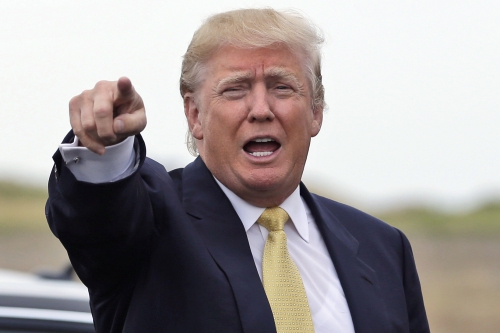


 Toutes ses anecdotes, que The Economist a rapportées récemment, étaient parues dans un livre de Gwenda Blair sur les trois générations de Trump. Une bonne part du succès des Trump en affaires vient de leur nom : Trump est un nom facile à retenir et peut parfaitement s’afficher sur des façades, des enseignes ou des affiches, étant un excellent nom de marque. Le nom est allemand mais Donald a toujours essayer de le cacher : dans son autobiographie, il évite d’évoquer ses racines allemandes et raconte que son père était un Suédois. Pure mystification.
Toutes ses anecdotes, que The Economist a rapportées récemment, étaient parues dans un livre de Gwenda Blair sur les trois générations de Trump. Une bonne part du succès des Trump en affaires vient de leur nom : Trump est un nom facile à retenir et peut parfaitement s’afficher sur des façades, des enseignes ou des affiches, étant un excellent nom de marque. Le nom est allemand mais Donald a toujours essayer de le cacher : dans son autobiographie, il évite d’évoquer ses racines allemandes et raconte que son père était un Suédois. Pure mystification.
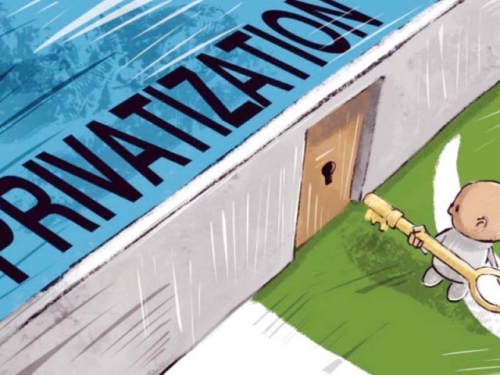

 Americans became a highly literate people beginning in Colonial times because the ability to read the Bible was encouraged and expected at all ages, five and above. Schooling was valued so a book like Noah Webster’s “Blue-Backed Speller” became a best seller found in nearly every home. Historically, for 3,500 years, countries with languages with alphabets have successfully taught their citizens to read by using sound-to-letter correspondence, i.e. phonics. But in 1929-30, John Dewey began training America’s elementary teachers to teach reading by the memorization of sight words. The abject failure of American schools to teach children to read began then and continues unabated to this day, even in the face of that appalling 2003 finding of 93,000,000 functional illiterates age 16 and over! THAT alone should have slapped both shame and sense into educators at all levels, from first-grade teachers through university teacher training professors, all across the nation. But it did not. How telling; how utterly shameful that they all were able to disregard the findings; to never look at themselves in any mirrors; and to continue doing what they have been doing since Dewey set them on the oh, so, erroneous path.
Americans became a highly literate people beginning in Colonial times because the ability to read the Bible was encouraged and expected at all ages, five and above. Schooling was valued so a book like Noah Webster’s “Blue-Backed Speller” became a best seller found in nearly every home. Historically, for 3,500 years, countries with languages with alphabets have successfully taught their citizens to read by using sound-to-letter correspondence, i.e. phonics. But in 1929-30, John Dewey began training America’s elementary teachers to teach reading by the memorization of sight words. The abject failure of American schools to teach children to read began then and continues unabated to this day, even in the face of that appalling 2003 finding of 93,000,000 functional illiterates age 16 and over! THAT alone should have slapped both shame and sense into educators at all levels, from first-grade teachers through university teacher training professors, all across the nation. But it did not. How telling; how utterly shameful that they all were able to disregard the findings; to never look at themselves in any mirrors; and to continue doing what they have been doing since Dewey set them on the oh, so, erroneous path.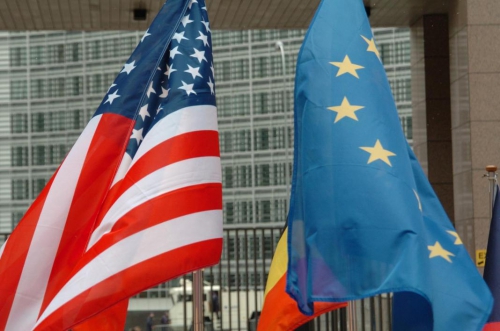

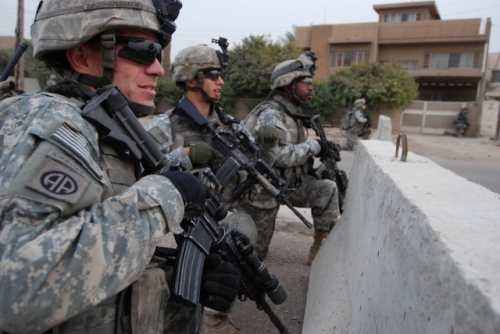
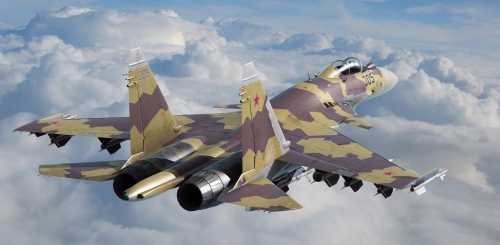


 Deux mondes sont désormais envisageables en Europe : soit nous aurons une Europe des patries et des citoyens, portée par des valeurs européennes, soit nous aurons une Europe noyée dans un monde globalisé, où les humains seraient tous employés, consommateurs et, devenus âgés, sources de revenus pour l’industrie de la santé.
Deux mondes sont désormais envisageables en Europe : soit nous aurons une Europe des patries et des citoyens, portée par des valeurs européennes, soit nous aurons une Europe noyée dans un monde globalisé, où les humains seraient tous employés, consommateurs et, devenus âgés, sources de revenus pour l’industrie de la santé.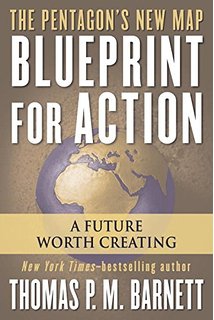 Herfried Münkler, de l’Université Humboldt de Berlin, est désormais un théoricien politique en vue en Allemagne : pour lui, l’option impériale russe, qui vise à acquérir ou à récupérer des territoires comme la Crimée, par exemple, est un mode archaïque d’action sur le monde. Pourquoi ? Parce qu’il parie sur un processus d’acquisition territoriale qui coûte cher sur le plan économique, surtout lorsqu’on tient compte de toutes ses retombées ultérieures (gestion et défense du territoire acquis, installation des communications, etc.). Pour Münkler, la pratique impériale russe est quelque peu anachronique. Les Etats-Unis, en revanche, parient pour un contrôle de tous les types de flux : flux de capitaux, flux générés par les mobilités humaines (voyages, transhumances, tourisme, affaires), notamment les migrations, flux des données. De cette façon, ils gèrent les informations les plus pertinentes qui leur permettent de téléguider les flux qu’ils choisissent d’influencer. Le contrôle des flux de données entre pourtant en conflit avec les principes démocratiques et avec les droits de l’homme : mais le pragmatisme américain ne s’en soucie guère, l’exercice effectif de la puissance prime dans le jeu qu’il joue sur l’échiquier planétaire.
Herfried Münkler, de l’Université Humboldt de Berlin, est désormais un théoricien politique en vue en Allemagne : pour lui, l’option impériale russe, qui vise à acquérir ou à récupérer des territoires comme la Crimée, par exemple, est un mode archaïque d’action sur le monde. Pourquoi ? Parce qu’il parie sur un processus d’acquisition territoriale qui coûte cher sur le plan économique, surtout lorsqu’on tient compte de toutes ses retombées ultérieures (gestion et défense du territoire acquis, installation des communications, etc.). Pour Münkler, la pratique impériale russe est quelque peu anachronique. Les Etats-Unis, en revanche, parient pour un contrôle de tous les types de flux : flux de capitaux, flux générés par les mobilités humaines (voyages, transhumances, tourisme, affaires), notamment les migrations, flux des données. De cette façon, ils gèrent les informations les plus pertinentes qui leur permettent de téléguider les flux qu’ils choisissent d’influencer. Le contrôle des flux de données entre pourtant en conflit avec les principes démocratiques et avec les droits de l’homme : mais le pragmatisme américain ne s’en soucie guère, l’exercice effectif de la puissance prime dans le jeu qu’il joue sur l’échiquier planétaire.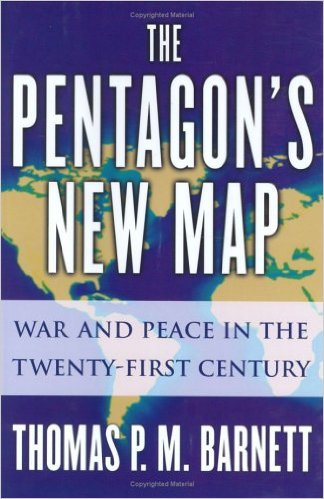 Pour Barnett, cette globalisation, cette gestion des flux, ne peut advenir que s’il y a mélange racial généralisé, de façon à établir en Europe, une race nouvelle, « brune claire ». Cet objectif ne peut être atteint que si l’on amène en Europe chaque année 1,5 million d’immigrants venus du tiers-monde africain. Il faut, ajoute-t-il, une Europe où le QI moyen ne dépasse pas le chiffre de 90. Ainsi, la population sera trop stupide pour comprendre qu’elle est incluse dans un « One World », dans un « nouvel ordre mondial » mais suffisamment intelligente pour pouvoir travailler. Dans le cas de l’Europe, travailler, cela signifie produire des biens largement appréciés dans le cadre d’entreprises, qui paieront mal leurs salariés et dont les profits gigantesques couleront tout droit dans les poches des propriétaires transnationaux.
Pour Barnett, cette globalisation, cette gestion des flux, ne peut advenir que s’il y a mélange racial généralisé, de façon à établir en Europe, une race nouvelle, « brune claire ». Cet objectif ne peut être atteint que si l’on amène en Europe chaque année 1,5 million d’immigrants venus du tiers-monde africain. Il faut, ajoute-t-il, une Europe où le QI moyen ne dépasse pas le chiffre de 90. Ainsi, la population sera trop stupide pour comprendre qu’elle est incluse dans un « One World », dans un « nouvel ordre mondial » mais suffisamment intelligente pour pouvoir travailler. Dans le cas de l’Europe, travailler, cela signifie produire des biens largement appréciés dans le cadre d’entreprises, qui paieront mal leurs salariés et dont les profits gigantesques couleront tout droit dans les poches des propriétaires transnationaux. 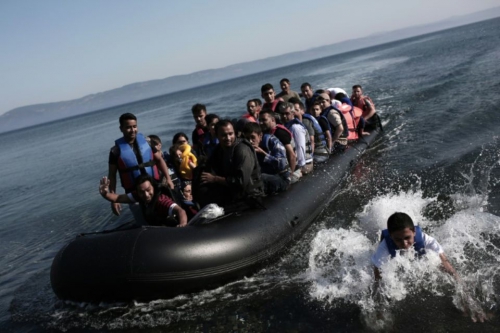

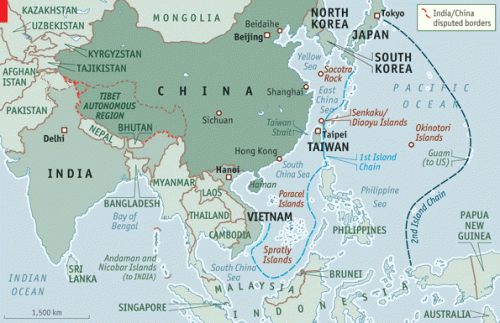

 John Calvin (1509-1564) appeared as a player on the historical stage during an intense developmental period for Western civilization. The Roman Catholic Church had wielded power in the West for over a millennium, and during that time it had become increasingly corrupt as an institution – so much so that by the 16th century the Church hierarchy was funded (to a large degree) by a direct marketing scheme known as “indulgences.” How the indulgences worked were as follows: No matter how grievously someone might have “sinned,” one could buy a piece of paper signed by either a Bishop or a Cardinal, which guaranteed a place in heaven for that particular person or a loved one of the person’s own choosing. These “get-out-of-hell-free” cards were sold by members of the clergy through franchises granted by the Church hierarchy. The typical indulgence erased one’s previous sins, but for a larger fee there was a twisted kind of“super”indulgence which erased any future sins one might commit as well, no matter how great or blasphemous.
John Calvin (1509-1564) appeared as a player on the historical stage during an intense developmental period for Western civilization. The Roman Catholic Church had wielded power in the West for over a millennium, and during that time it had become increasingly corrupt as an institution – so much so that by the 16th century the Church hierarchy was funded (to a large degree) by a direct marketing scheme known as “indulgences.” How the indulgences worked were as follows: No matter how grievously someone might have “sinned,” one could buy a piece of paper signed by either a Bishop or a Cardinal, which guaranteed a place in heaven for that particular person or a loved one of the person’s own choosing. These “get-out-of-hell-free” cards were sold by members of the clergy through franchises granted by the Church hierarchy. The typical indulgence erased one’s previous sins, but for a larger fee there was a twisted kind of“super”indulgence which erased any future sins one might commit as well, no matter how great or blasphemous.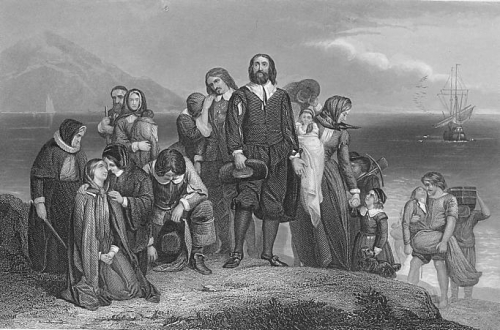





 Un factor principal en las guerras y revueltas que han sido promovidas por los EEUU es el deseo de expandir las exportaciones y los mercados financieros. Mientras que se nos dice rutinariamente que “el nacionalismo”, equiparado con “la xenofobia”, es la principal causa de la guerra, del genocidio y de otros males, las guerras y revueltas que han plagado el mundo durante el siglo pasado se han llevado a cabo en nombre de la “democracia” y el “orden mundial”. Estos eran – y son – los objetivos declarados de las dos guerras mundiales, la “Guerra Fría” y la actual “guerra contra el terrorismo”. En todas partes esto ha avanzado y ha continuado mediante la apertura de las naciones a la privatización y a la globalización. Tanto los “Catorce Puntos” de Woodrow Wilson para la reconstrucción internacional después de la Primera Guerra Mundial, como “La Carta del Atlántico” de Roosevelt que establece los objetivos de guerra de los aliados, confirmaron al “libre comercio” como un importante objetivo de guerra. El punto 3 del manifiesto wilsoniano exigía:
Un factor principal en las guerras y revueltas que han sido promovidas por los EEUU es el deseo de expandir las exportaciones y los mercados financieros. Mientras que se nos dice rutinariamente que “el nacionalismo”, equiparado con “la xenofobia”, es la principal causa de la guerra, del genocidio y de otros males, las guerras y revueltas que han plagado el mundo durante el siglo pasado se han llevado a cabo en nombre de la “democracia” y el “orden mundial”. Estos eran – y son – los objetivos declarados de las dos guerras mundiales, la “Guerra Fría” y la actual “guerra contra el terrorismo”. En todas partes esto ha avanzado y ha continuado mediante la apertura de las naciones a la privatización y a la globalización. Tanto los “Catorce Puntos” de Woodrow Wilson para la reconstrucción internacional después de la Primera Guerra Mundial, como “La Carta del Atlántico” de Roosevelt que establece los objetivos de guerra de los aliados, confirmaron al “libre comercio” como un importante objetivo de guerra. El punto 3 del manifiesto wilsoniano exigía:


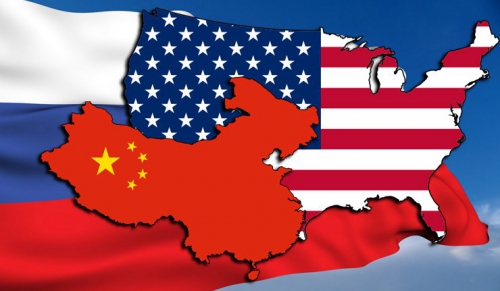
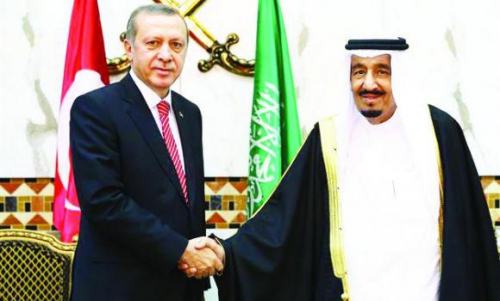
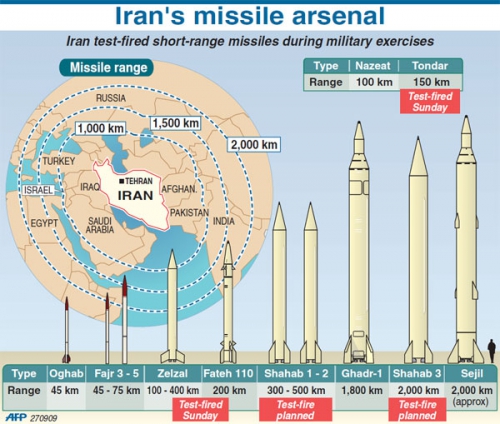


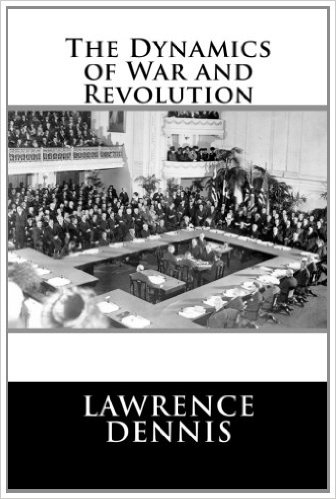 Two: Lawrence Dennis was part African-American, a fact that was marginally believable at first glance, given his “swarthy” or “bronzed” complexion and short, wiry hair. Dennis could “pass for white” if he wanted to, and so he did for several decades. But this was mainly for reasons of convenience. During his years at Exeter, Harvard, the diplomatic corps, and Wall Street, talking about a mulatto heritage was just an unnecessary complication, and so he didn’t. At the end of the day there is no reason to believe he was ashamed of his mixed-race heritage; it is said that when he died in his eighties he was
Two: Lawrence Dennis was part African-American, a fact that was marginally believable at first glance, given his “swarthy” or “bronzed” complexion and short, wiry hair. Dennis could “pass for white” if he wanted to, and so he did for several decades. But this was mainly for reasons of convenience. During his years at Exeter, Harvard, the diplomatic corps, and Wall Street, talking about a mulatto heritage was just an unnecessary complication, and so he didn’t. At the end of the day there is no reason to believe he was ashamed of his mixed-race heritage; it is said that when he died in his eighties he was  A most bizarre start in life for a diplomat, or Wall Street investment banker, or fascist economic theorist—all of which Dennis would be in the 1920s and ’30s.
A most bizarre start in life for a diplomat, or Wall Street investment banker, or fascist economic theorist—all of which Dennis would be in the 1920s and ’30s. 1. Gerald Horne, The Color of Fascism: Lawrence Dennis, Racial Passing, and the Rise of Right-Wing Extremism in the United States (New York: New York University Press, 2007).
1. Gerald Horne, The Color of Fascism: Lawrence Dennis, Racial Passing, and the Rise of Right-Wing Extremism in the United States (New York: New York University Press, 2007).